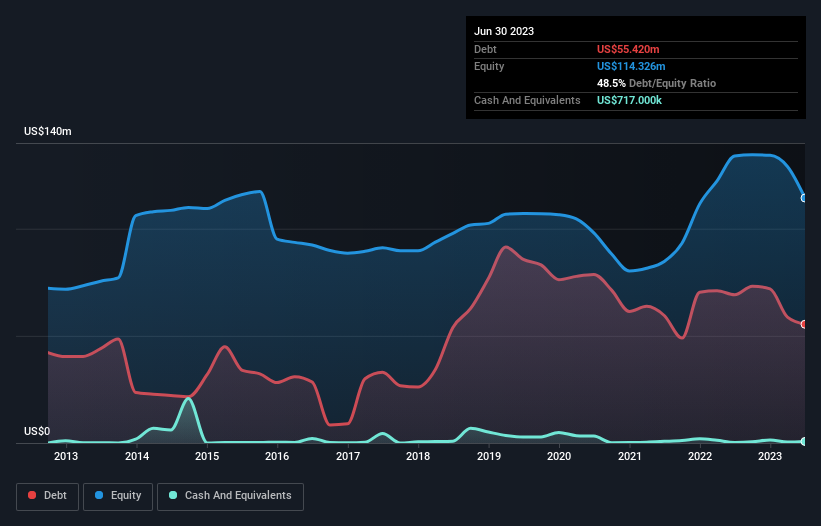- United States
- /
- Metals and Mining
- /
- NasdaqGM:ACNT
Ascent Industries (NASDAQ:ACNT) Has Debt But No Earnings; Should You Worry?
Warren Buffett famously said, 'Volatility is far from synonymous with risk.' So it might be obvious that you need to consider debt, when you think about how risky any given stock is, because too much debt can sink a company. As with many other companies Ascent Industries Co. (NASDAQ:ACNT) makes use of debt. But should shareholders be worried about its use of debt?
When Is Debt A Problem?
Debt and other liabilities become risky for a business when it cannot easily fulfill those obligations, either with free cash flow or by raising capital at an attractive price. Ultimately, if the company can't fulfill its legal obligations to repay debt, shareholders could walk away with nothing. However, a more frequent (but still costly) occurrence is where a company must issue shares at bargain-basement prices, permanently diluting shareholders, just to shore up its balance sheet. Having said that, the most common situation is where a company manages its debt reasonably well - and to its own advantage. When we think about a company's use of debt, we first look at cash and debt together.
Check out our latest analysis for Ascent Industries
What Is Ascent Industries's Net Debt?
As you can see below, Ascent Industries had US$55.4m of debt at June 2023, down from US$69.2m a year prior. And it doesn't have much cash, so its net debt is about the same.

How Healthy Is Ascent Industries' Balance Sheet?
The latest balance sheet data shows that Ascent Industries had liabilities of US$34.3m due within a year, and liabilities of US$83.8m falling due after that. Offsetting this, it had US$717.0k in cash and US$35.1m in receivables that were due within 12 months. So it has liabilities totalling US$82.3m more than its cash and near-term receivables, combined.
This deficit is considerable relative to its market capitalization of US$87.5m, so it does suggest shareholders should keep an eye on Ascent Industries' use of debt. Should its lenders demand that it shore up the balance sheet, shareholders would likely face severe dilution. There's no doubt that we learn most about debt from the balance sheet. But it is future earnings, more than anything, that will determine Ascent Industries's ability to maintain a healthy balance sheet going forward. So if you're focused on the future you can check out this free report showing analyst profit forecasts.
In the last year Ascent Industries wasn't profitable at an EBIT level, but managed to grow its revenue by 6.8%, to US$374m. We usually like to see faster growth from unprofitable companies, but each to their own.
Caveat Emptor
Over the last twelve months Ascent Industries produced an earnings before interest and tax (EBIT) loss. Indeed, it lost a very considerable US$8.8m at the EBIT level. When we look at that and recall the liabilities on its balance sheet, relative to cash, it seems unwise to us for the company to have any debt. So we think its balance sheet is a little strained, though not beyond repair. For example, we would not want to see a repeat of last year's loss of US$4.5m. So in short it's a really risky stock. There's no doubt that we learn most about debt from the balance sheet. But ultimately, every company can contain risks that exist outside of the balance sheet. We've identified 2 warning signs with Ascent Industries , and understanding them should be part of your investment process.
If you're interested in investing in businesses that can grow profits without the burden of debt, then check out this free list of growing businesses that have net cash on the balance sheet.
New: Manage All Your Stock Portfolios in One Place
We've created the ultimate portfolio companion for stock investors, and it's free.
• Connect an unlimited number of Portfolios and see your total in one currency
• Be alerted to new Warning Signs or Risks via email or mobile
• Track the Fair Value of your stocks
Have feedback on this article? Concerned about the content? Get in touch with us directly. Alternatively, email editorial-team (at) simplywallst.com.
This article by Simply Wall St is general in nature. We provide commentary based on historical data and analyst forecasts only using an unbiased methodology and our articles are not intended to be financial advice. It does not constitute a recommendation to buy or sell any stock, and does not take account of your objectives, or your financial situation. We aim to bring you long-term focused analysis driven by fundamental data. Note that our analysis may not factor in the latest price-sensitive company announcements or qualitative material. Simply Wall St has no position in any stocks mentioned.
About NasdaqGM:ACNT
Ascent Industries
An industrials company, produces and sells stainless steel pipe and tube, and specialty chemicals in the United States and internationally.
Flawless balance sheet and slightly overvalued.
Market Insights
Community Narratives



